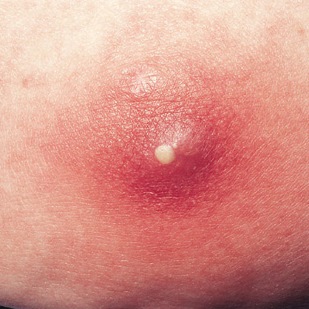
Chronic boils can be very uncomfortable, but more than that, having recurring boils increases your chances of developing serious complications like sepsis (a blood infection), osteomyelitis (a bone infection), or endocarditis (an infection of the heart). While such complications are rare, the more often you have boils, the more likely you are to end up with complications.
What Causes Chronic Boils?
A boil is simply a small pocket of infection beneath the skin. Sometimes they are referred to as skin abscesses. A little bacteria gets under the skin when you have a small cut, scratch, nick, insect bite, ingrown hair, or other opening and forms a bump that starts out looking much like a pimple. As the infection grows, however, the boil gets bigger and bigger, sometimes as large as a golf ball or even a baseball. It fills with pus, which is a mixture of old white blood cells, bacteria, and other debris. It’s painful.
While boils are not rare, most people do not get them often. Some people have never had a boil in their entire lives. If you get boils regularly, it’s a sign that something is wrong. We recommend seeing your doctor if you frequently have boiled, even if they don’t seem to be causing any serious problems, to figure out what’s causing them and to prevent the possibility of serious complications occurring in the future.
You are more likely to have recurring boils if:
- You are obese
- You regularly remaining sitting for extended periods of time (this can cause a type of boil on the buttocks called a pilonidal cyst; here is more about boils on the buttocks)
- You shave frequently and use improper shaving techniques (this can lead to ingrown hairs which can cause boils; find out more about boils caused by ingrown hairs)
- You have diabetes
- You have a disorder of the immune system
- You take certain medications that suppress the immune system
- You have poor hygiene
- You have poor nutrition
- You’re regularly exposed to chemicals that irritate the skin
- You are a carrier of a form of bacteria called Staphylococcus aureus, a common cause of boils (you can carry it on your skin and not know it)
Treatment For Chronic Boils

While boils often go away without any medical treatment, we recommend seeing a doctor if you have frequent boils so your doctor can help you figure out why you keep getting them. Your doctor may order blood tests to check for things like diabetes and immune system disorders.
Your doctor may also want to test you for Staphylococcus aureus since people with chronic boils are often carriers. According to the National Health Services(1) in the UK, the treatment depends on where you carry the bacterium. If it’s found on your skin, it can be treated with antibacterial soap. If it’s found in your nostrils, it can be treated with antibiotic nasal cream.
Boils may be treated with oral antibiotics and in some instances, your doctor may recommend lancing and draining them. Don’t try to pop or lance boils yourself, though, as that can spread the infection. You can read more about treating boils here.
In addition to prescribing treatment for any medical conditions that may be contributing to the development of boils, your doctor can recommend steps you can take to prevent boils in the future. You can learn more about how to prevent boils.
Our Favorite Remedy For Boils
Our favorite remedy for boils is an all-natural essential oil called NZ Country Manuka Oil. If you get boils regularly, we still recommend seeing a doctor help you figure out what’s causing them, but NZ Country Manuka Oil can help treat the boils when you get them. It contains only 100% pure Manuka oil and has no additives or preservatives. To learn how it can help boils heal quickly and to relieve discomfort, just follow the links provided.
(1)NHS: Boils
